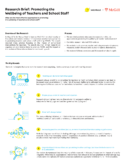Research Brief: Promoting the Wellbeing of Teachers and School Staff
Download the Research Brief! (217.94 kB / pdf)
DownloadConducted by Dr. Nancy Heath’s team at McGill University, this research provides a summary of a literature review on effective approaches highlighting some of the key do’s and don’ts when it comes to promoting the well-being of teachers and school staff.
References
Reviews
Emerson, L., et al (2017). Teaching mindfulness to teachers: A systematic review and narrative synthesis. Mindfulness, 8(5), 1136-1149.
Hwang, Y. et al (2017). A systematic review of mindfulness interventions for in-service teachers: A tool to enhance teacher wellbeing and performance. Teaching And Teacher
Education, 6426-42.
Mccallum, F. et al (2017). Teacher wellbeing: a review of the literature. The Association of Independent Schools of New South Wales Limited, Australia.
Roeser, R. W. et al (2012). Mindfulness training and teachers’ professional development: An emerging area of research and practice. Child Development Perspectives, 6(2),
167-173.
Whitley, J et al (2013). Promoting mental health literacy among educators: Critical in school-based prevention and intervention. Canadian Journal Of School Psychology, 28(1), 56-70.
Articles
Au, D. W. et al. (2016). Psychosomatic and physical responses to a multi-component stress management program among teaching professionals: A randomized study of
cognitive behavioral intervention (CB) with complementary and alternative medicine (CAM) approach. Behaviour research and therapy, 80, 10-16.
Benn, R. et al. (2012). Mindfulness training effects for parents and educators of children with special needs. Developmental psychology, 48(5), 1476.
Beshai, S., McAlpine, L., Weare, K., & Kuyken, W. (2016). A non-randomised feasibility trial assessing the efficacy of a mindfulness-based intervention for teachers to reduce stress and improve well-being. Mindfulness, 7(1), 198-208.Chan, D. W. (2010). Gratitude, gratitude intervention and subjective well-being among Chinese school teachers in Hong Kong. Educational Psychology, 30(2), 139-153.
Chan, D. W. (2013). Counting blessings versus misfortunes: positive interventions and subjective well-being of Chinese school teachers in Hong Kong. Educational Psychology, 33(4), 504-519.
Cheek, J. R. et al. (2003). Using music therapy techniques to treat teacher burnout. Journal of Mental Health Counseling, 25(3), 204-217.
Cook, C. R. et al (2017). Promoting secondary teachers’ well-being and intentions to implement evidence-based practices: Randomized evaluation of the ACHIEVER resilience curriculum. Psychology in the Schools, 54(1), 13-28.
Critchley, H., & Gibbs, S. (2012). The effects of positive psychology on the efficacy beliefs of school staff. Educational and Child psychology, 29(4), 64.
Ebert, D. D. et al (2014). Efficacy of an internet-based problem-solving training for teachers: results of a randomized controlled trial. Scandinavian journal of work, environment & health, 582-596.
Frank, J. L. et al (2015). The effectiveness of mindfulness-based stress reduction on educator stress and well-being: Results from a pilot study. Mindfulness, 6(2), 208-216.
Gold, E. et al (2010). Mindfulness-based stress reduction (MBSR) for primary school teachers. Journal of child and family studies, 19(2), 184-189. Doi: 10.1007/s10826-009-9344-0
Gouda, S. et al (2016). Students and teachers benefit from mindfulness-based stress reduction in a school-embedded pilot study. Frontiers in psychology, 7, 590.
Harris, A. R. et al (2016). Promoting stress management and wellbeing in educators: Feasibility and efficacy of a school-based yoga and mindfulness intervention. Mindfulness, 7(1), 143-154.
Jeffcoat, T., & Hayes, S. C. (2012). A randomized trial of ACT bibliotherapy on the mental health of K-12 teachers and staff. Behaviour Research and Therapy, 50(9), 571-579. Doi:10.1016/j.brat.2012.05.008
Jennings, P. A., Frank, J. L., Snowberg, K. E., Coccia, M. A., & Greenberg, M. T. (2013). Improving classroom learning environments by Cultivating Awareness and Resilience in Education (CARE): Results of a randomized controlled trial. School Psychology Quarterly, 28(4), 374.
Larson, M. et al. (2010). Stressed Teachers Don’t Make Good Implementers: Examining the Interplay Between Stress Reduction and Intervention Fidelity. School Mental
Health, 10(1), 61-76.
LeCheminant, J., et al. (2017). Changes in Behaviors and Outcomes Among School-Based Employees in a Wellness Program. Health promotion practice, 18(6), 895-901.
Nosaka, M., & Okamura, H. (2015). A single session of an integrated yoga program as a stress management tool for school employees: Comparison of daily practice and
nondaily practice of a yoga therapy program. The Journal of Alternative and Complementary Medicine, 21(7), 444-449.
Sharrocks, L. (2014). School staff perceptions of well-being and experience of an intervention to promote well-being. Educational Psychology in Practice, 30(1), 19-36.
Schnaider-Levi, L et al (2017). Inquiry-Based Stress Reduction Meditation Technique for Teacher Burnout: A Qualitative Study. Mind, Brain, and Education, 11(2), 75-84.
Schussler, D. L. et al (2016). Improving teacher awareness and well-being through CARE: A qualitative analysis of the underlying mechanisms. Mindfulness, 7(1), 130-142.
Siu, O. L., et al (2014). Intervention studies on enhancing work well-being, reducing burnout, and improving recovery experiences among Hong Kong health care workers and teachers. International Journal of Stress Management, 21(1), 69.
Unterbrink, T. et al (2010). Improvement in school teachers’ mental health by a manual-based psychological group program. Psychotherapy and psychosomatics, 79(4), 262-
264.
Vesely, A. K., Saklofske, D. H., & Nordstokke, D. W. (2014). EI training and pre-service teacher wellbeing. Personality and Individual Differences, 65, 81-85.
Wolf, S. et al (2015). Preliminary impacts of the “Learning to Read in a Healing Classroom” intervention on teacher well-being in the Democratic Republic of the Congo.
Teaching and Teacher Education, 52, 24-36.
Woynarowska-Soldan, M. (2015). Project on school staff health promotion in Poland: the first experiences. Health Education, 115(3/4), 405-419.

